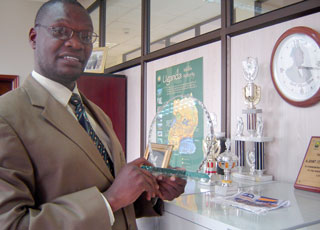
By Agnes Asiimwe
Moses Mapesa started as a game warden in national parks in 1988 and rose to become executive director, Uganda Wildlife Authority (UWA) in 2005. He has received several awards for his wildlife conservation effort, including the Fred Packard International Parks Merit Award and two vocational awards from the Rotary Club of Port Bell. He studied Forestry for his undergraduate, Environment and Natural Resources Management for his Masters degree.
What are your biggest challenges?
We want development but we must balance development with nature. That awareness, that appreciation, is a growing challenge.
We attract few tourists compared to Kenya and Tanzania. We need a minimum of 200,000 visitors a year. Kenya and Tanzania each receive about 900,000 tourists into their parks. If you climb Mt. Kilimanjaro, the highest volcanic mountain, you should also want to climb Mt. Rwenzori which is the highest block mountain. These are two different experiences. We have gorillas which are not in Kenya; in other words, there is every reason for any visitor going into Kenya or Tanzania to come to Uganda as well. Only about 30 percent cross-over. Our newspaper stories, though most may not be disputable, impact negatively on tourism. In other countries like Thailand and Kenya, the media is conscious of this fact. The other countries invest in tourism. After the election violence in Kenya, the government injected about $10 million in image promotion to reassure the world that it was a one off incident and it was over. For Uganda, people still ask about Idi Amin. Our effort to make people understand that there is a different government is minimal.
How are you resolving these challenges?
| ÂMapesa’s management guiding principles
I value my staff. I recognise and encourage them to value themselves because if they do, then they will be committed to the job and loyal to the organisation. I ask them to concentrate their mind on the job. Without it, productivity will be very low and the tendency for bad interpersonal relations will be high. I encourage them to live within their means. We provide our staff with accommodation, medical care and uniforms. We also avail them transport, communication, and their salaries are geared towards personal development. Finally, care for the family is paramount because it gives one support. |
The ministry of Tourism has a comprehensive plan to deal with negative publicity. One approach is to change people’s perceptions through trade fairs that happen in different cities.
The private sector can invest in the sector and be an extra voice in improving our image. We have new establishments coming up. Kyobe Lodge in Murchison Falls Park will be opened in April this year; Pakuba Lodge in Murchison will be operational in 2010. All the lodges that were destroyed during the wars will be re-developed. We have new facilities in Kibaale, Queen Elizabeth National Park, Bwindi Forest, Lake Mburo National Park and more are coming up.
We are also investing in conservation-led development and engage the private sector. For example, we have minerals in the Albertine area, we get the oil but with minimal damage to the eco-system. We have a forum where we meet quarterly and discuss how this co-existence can happen. We participate in other civil society organised forums like Uganda Wildlife Society, Nature Uganda, and Worldwide Fund for Nature to see how to manage natural resources in the broader perspective. We have discussed with the Population Secretariat about ensuring that a growing population does not become a problem to natural resources.
Where do you see UWA in the next five years?
We would like to see people appreciate wildlife. In Kafu, Kalangala, Rakai and Karamoja, we are working with local governments and communities where they can actively participate in the management of wildlife on public land or their pieces of land. Chameleons, tortoises, snakes, birds, should no longer be seen as pests but pets of monetary value. Wildlife outside of protected areas in the next 10 years should begin to contribute to the local and national economy. If we can demonstrate to people that they can make more money by keeping the area in its natural state, we would be a happy organisation.
****
About UWA: Uganda Wildlife Authority manages 10 national parks, 12 wildlife reserves and 14 wildlife sanctuaries. Since its inception in August 1996, UWA has restored Uganda’s protected areas and increased wildlife populations. This has led to a boom in tourism.
 The Independent Uganda: You get the Truth we Pay the Price
The Independent Uganda: You get the Truth we Pay the Price





